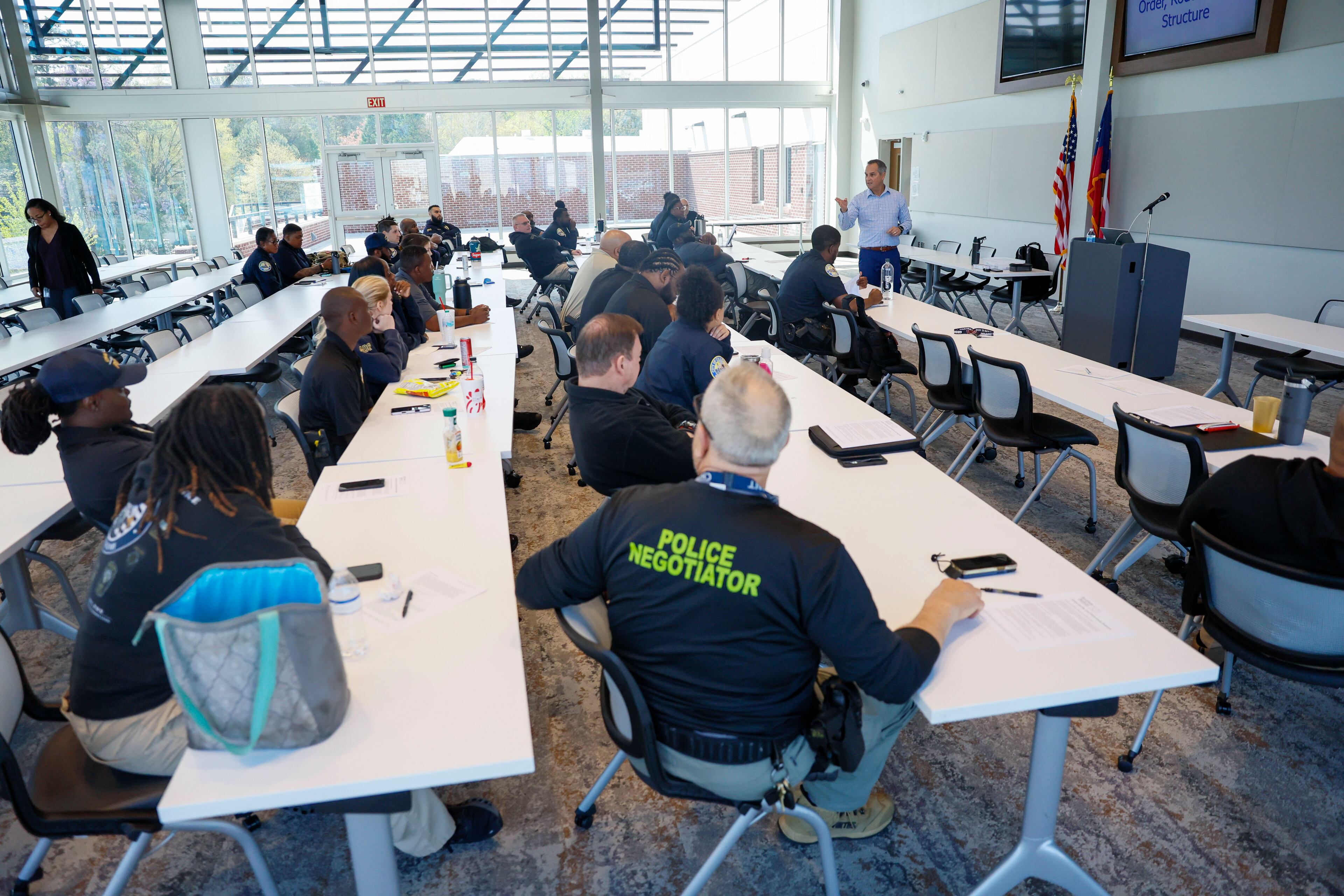Chamblee officers learn how to interact with people on the autism spectrum

Chamblee police officer Brandi Boddy was assisting a mother and five children after a car accident a couple weeks ago when one of the children started screaming.
Boddy had tried to talk to the boy, but he was not responding to her questions. Another officer approached him, trying to keep him away from the car that was being towed, but the boy began screaming.
It wasn’t until one of the other children told Boddy that the boy was autistic that she realized she had to take a different approach.
“Once we understood that he was autistic, there was a certain way how to deal with him and try to help him (compared to) his siblings who were a little bit more understanding of our commands or what we needed from them or how we could help them,” Boddy said.
The situation came back to Boddy’s mind on Tuesday as the Chamblee Police Department held a two-day specialized autism training for officers in honor of Autism Awareness Month. According to the Centers for Disease Control and Prevention, about 1 in 36 children have been identified with autism spectrum disorder.

Chief Michael Dieppa said the goal of the training is to ensure officers are able to pick up cues and behaviors they might encounter when dealing with autistic people.
“For us to do this training and to educate our officers is very important because the likelihood of an encounter is great and we would want to minimize the risk, to the extent possible, of any likelihood that we would use force thinking that we have a person under the influence when really we’re dealing with somebody who is simply on the spectrum,” Dieppa said.
Dieppa said it’s becoming more likely for officers to encounter people with autism on a regular basis, like Boddy did a couple of weeks ago.
“We just want to be as prepared as we can as a law enforcement agency to encounter the public … especially (those with) autism spectrum disorder,” he said.
The training is being led by Bart Barta, who has been training law enforcement across the country on how to interact with people with autism for almost two decades. Barta, who worked in law enforcement for 31 years before he retired, has a son with autism.
He said one of the reasons he offers training to law enforcement is because he noticed officers didn’t know how to recognize and respond to individuals with autism around the country. He decided to reach out to the University of Miami, near where he had worked as a police officer, and they helped him craft a training course to help law enforcement agencies.
“When I retired I just told my wife, I said, ‘I’ll go around the country wherever anybody wants this training,’ I’ll go and I’ll provide this training to them so that we can have better interactions between individuals with autism and law enforcement,” Barta said.

Last week, the body of a 5-year-old boy, who was autistic and nonverbal, was found in a Gwinnett County pond behind his apartment complex. Barta said he hears about someone with autism drowning almost every day. Part of his training deals with how to search missing persons who are autistic.
“It’s horrible when you hear about these stories that happen, so you know one of the things I try to do is try to prepare them for how to respond to these calls involving individuals, be it children, teens, or adults who might go missing,” he said.
Chamblee is the third law enforcement agency in Georgia to hire Barta for the specialized autism training, in addition to South Fulton and Thomasville.
The Dunwoody Police Department also trains officers on dealing with individuals who have autism, while the Cumming Police Department launched the Community Autism Program in August 2024 to allow family members of children or adults with autism to register through the agency to receive decals and wrist bands that will alert officers to individuals with autism.
The Cobb County Sheriff’s Office became the first sheriff’s office in Georgia to be certified as KultureCity Sensory Inclusive, which means their deputies went through specialized training and have new sensory kits to assist individuals with autism, PTSD, dementia and other conditions.
The Georgia Peace Officer Standards Training Council, which provides law enforcement officers with certifications, also offers a course on “Autism and de-escalation.”

Boddy said she encourages other police officers to educate themselves and attend trainings, if offered by their agencies, to better understand people with autism. Dieppa said he encourages fellow law enforcement leaders to consider implementing similar training in their agencies.
Barta said, a lot of times, law enforcement agencies simply play a 30-minute training video on autism and call it a day, when he feels more is needed.
“I really do think most officers want to do what’s right, they want the best outcome possible,” he said. “If you don’t provide this kind of training, they’re going to mistakenly think this person is either mentally ill or they’re high on drugs, and it’s not going to go well, and I’ve seen this happen time and time again.”
In terms of what he hopes officers get out of the training, Barta said he just hopes they learn to “be patient.”
“Try to slow things down the best you can. Give these people with autism time to process and respond to your questions or your instructions or your directions, and understand that some of them are not going to understand your instructions or processes. It doesn’t mean they’re defying you,” he said.


